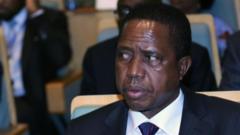Following a year-long investigation exposing the widespread theft of medical supplies intended for vulnerable Zambian patients, the US Embassy has announced a $50 million aid cut to Zambia, marking a significant development in US-Zambia relations and healthcare assistance.
US Suspends $50 Million Aid to Zambia Amidst Health Sector Corruption

US Suspends $50 Million Aid to Zambia Amidst Health Sector Corruption
The United States has halted substantial aid to Zambia's health sector due to alarming levels of drug theft and corruption.
The United States government recently declared its decision to reduce health sector aid to Zambia by $50 million (£37 million), citing what it describes as "systematic theft" of donated medical supplies. In an announcement, US Ambassador to Zambia, Michael Gonzales, described the withdrawal of funds as a "difficult" yet crucial step taken after multiple warnings directed towards the Zambian authorities to protect essential medicines meant for the country’s most vulnerable populations.
The US embassy clarified that it could no longer "underwrite the personal enrichment of fraudsters or the corrupt," stressing the need to prevent patients from having to pay for life-saving medications that were intended to be free. This decision is aligned with broader concerns regarding Zambia’s handling of foreign aid, particularly amidst rising corruption within the health sector.
Zambia's health services are substantially financed by international donors, with the US contributing roughly a third of public health expenditure. Investigations conducted by the US embassy unearthed disturbing evidence of a "country-wide theft" of medical supplies that were being funneled into the private sector and sold through local pharmacies. Reports noted that more than 2,000 pharmacies were found illicitly selling these donated goods, as a staggering 95% of the establishments inspected were implicated in the distribution of stolen items.
Despite the gravity of the situation, Zambian law enforcement initiatives appear to be focusing on lower-tier operatives rather than addressing the deeper issues within the supply chain. According to embassy representatives, efforts have led to minimal arrests, emphasizing a lack of urgency or substantial action from Zambian authorities to tackle the larger problem of health supply theft.
The impending aid cuts, set to take effect in January of the following year, will primarily impact vital medications used for treating diseases such as malaria, HIV, and tuberculosis. Gonzales further expressed remorse for the affected patients as he outlined the ramifications of the decision, asserting that the level of US support was no longer justifiable to American taxpayers under the current circumstances.
This funding suspension coincides with a broader pattern of cuts to international health programs under the Trump administration, which had previously indicated a freeze on foreign aid as part of its "America First" policy agenda. Notably, these cuts have had a debilitating effect on healthcare efforts in multiple countries across Africa battling significant health crises, especially concerning HIV.
In response to these developments, Zambian President Hakainde Hichilema has articulated a need for the government to bolster domestic resources to procure essential medical supplies, attributing the aid cuts to an international effort to redirect support away from corrupt administrations. As the situation unfolds, the Zambian government has yet to release a formal comment on the current status of its health sector amidst these accusations of corruption.





















